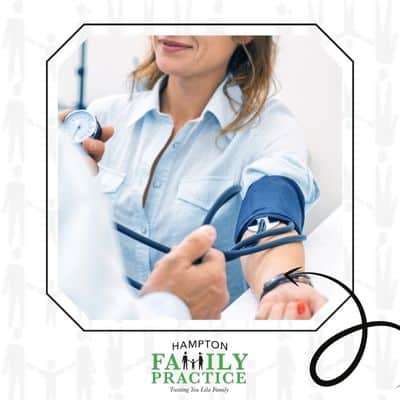At Hampton Family Practice, our team enjoys practicing preventive medicine by identifying potential risk factors that may affect your health. We can help you through lifestyle changes and/or medication to improve your long-term quality of life and longevity. A chronic but treatable health issue affecting more than 80 million Americans is high blood pressure (HBP), also known as hypertension.
According to the Centers for Disease Control (CDC), as many as one of three adults over age 20 has hypertension. Approximately 20 percent of adults with high blood pressure are unaware of their condition. The best way to obtain a diagnosis if you suspect you may have HBP is to visit a physician to have your blood pressure taken and discuss your results.

What Causes Hypertension?
Hypertension, or high blood pressure, occurs when the force of the blood flowing through your blood vessels, is consistently too high. How do we know what is “too high?” Blood pressure readings consist of two numbers in a fraction form, such as 110/70.
The systolic pressure is the top number in your blood pressure reading. This number represents the pressure exerted on the arteries when the heart muscle contracts, or beats. The bottom number is the diastolic pressure, which represents the arterial pressure the heart exerts between beats.
Understanding Blood Pressure Readings
According to the American Heart Association, the following numbers indicate normal and elevated blood pressure levels:
- Normal is about 120/80, although both numbers may be a little lower for healthy young people.
- Prehypertension ranges from 120-139/80-89.
- Stage 1 hypertension ranges from 140-159/90-99.
- Stage 2 hypertension is a blood pressure in which both systolic and diastolic pressures are consistently elevated at levels over 160/100.
- Hypertensive crisis is considered a medical emergency. A blood pressure of 180/110 or higher requires immediate medical attention.
Symptoms of Hypertension
Hypertension has a nickname: “The Silent Killer.” It’s a disease with no obvious symptoms, and when it goes unrecognized and untreated, the damage HBP does to your circulatory system can contribute to your likelihood of experiencing a heart attack or a stroke.
Additionally, certain genetic traits as well as your lifestyle choices can put you at greater risk for developing hypertension.
The following are symptoms reported by people suffering HBP:
- Headache
- Nose bleeds
- Dizziness
- Shortness of breath
- Stroke-like symptoms: The constant high pressure on the arteries and veins in your brain can cause vessels to rupture. If you experience an intense headache, confusion, trouble speaking, slurring of words, difficulty moving parts of the body, facial drooping and/or numbness, it’s important to call 911 immediately.
- Chest pain or pressure, uncontrollable sweating, dizziness, shortness of breath, jaw pain, back pain, shoulder pain and/or arm pain (especially in the left arm) can all be indicators of a heart attack. You should seek medical attention right away by calling 911.
Managing Hypertension
Keeping a log of your blood pressure readings is important in managing this condition. Clinics and pharmacies are good places to have your blood pressure checked between doctor’s visits. Obtaining a blood pressure measuring device to keep at home (some of which are automatic and easy to use by yourself) is a good idea for those who have chronically high pressure readings.
Hypertension can be managed in several ways, including:
- Diet. Changing your diet by avoiding high fat foods, fried foods and foods with high salt content can be enough to bring your blood pressure and cholesterol to a safe level. A change in diet may control your hypertension so that you do not need to take medication.
- Exercise. Studies show regular exercise, such as walking, swimming and biking, can effectively control high blood pressure.
- Medications. Many different types of medication are available if lifestyle changes are not sufficient.
If you have questions or wish to consult a physician for a blood pressure evaluation, call 757-838-6335 to schedule an appointment at Hampton Family Practice.
